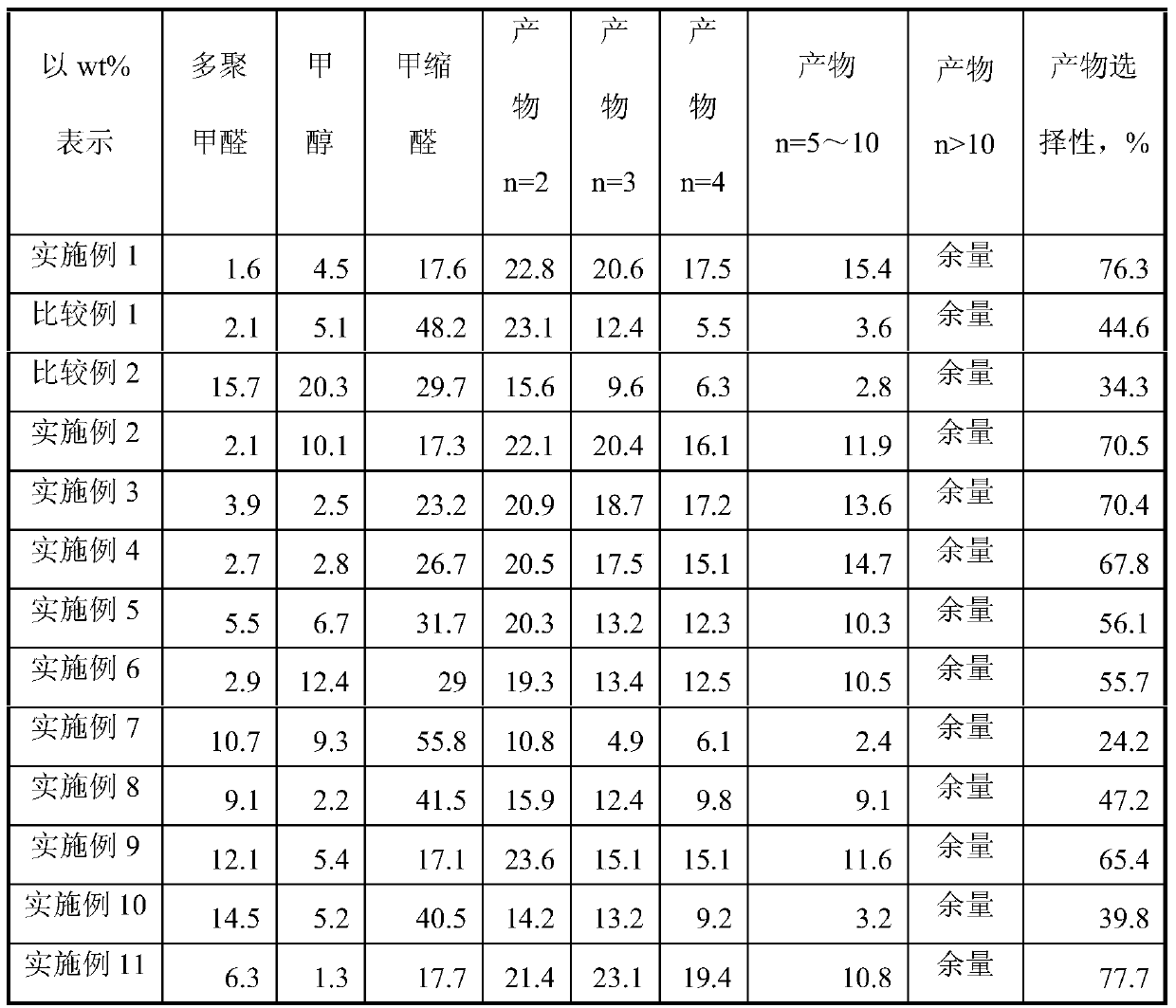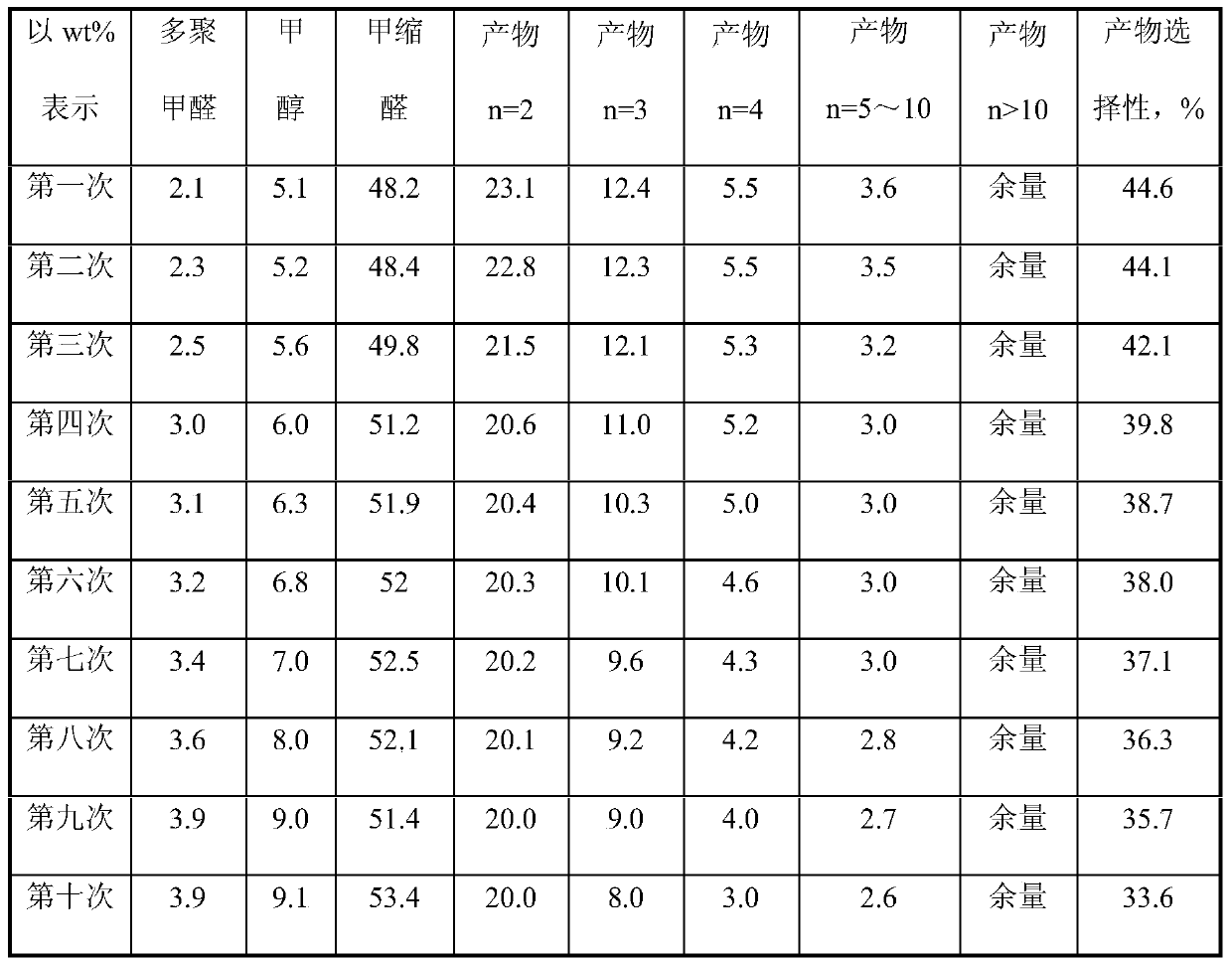Catalysts used in the synthesis of polyoxymethylene dimethyl ether
A technology of dimethyl ether and catalyst, which is applied in the field of catalysts, can solve the problems of high cost of paraformaldehyde and low catalyst reaction efficiency, and achieve the effect of good yield
- Summary
- Abstract
- Description
- Claims
- Application Information
AI Technical Summary
Problems solved by technology
Method used
Image
Examples
Embodiment 1
[0026] 1. Preparation of catalyst
[0027] (1) Polymerization and hybridization: at room temperature, add 144 grams of styrene, 16 grams of divinylbenzene, 1 gram of BPO and 40 grams of toluene to a 1000 ml three-necked flask and stir evenly, then add 40 grams of 500 mesh AlNiCoTi38, and stir evenly , after adding 300 grams of 1.0w% PVA aqueous solution, then react at 70°C for 3h, 80°C for 1h, and 95°C for 45min under stirring to obtain a pellet-shaped product. Stop stirring and keep boiling the pellet at 95°C for 30min. All the products in the three-necked flask were poured into water for cleaning. The product was washed with ethanol and then washed with H 2 O was washed, placed in an oven and dried at 80° C. for 4 h to obtain 200 g of catalyst precursor I.
[0028] (2) Sulfonation: Add 200 grams of catalyst precursor I to 400 grams of 1,2-dichloroethane to swell at room temperature for 4 hours, then add 100 grams of H with a purity of 98w%. 2 SO 4 , stirring and download...
Embodiment 2
[0035] 1. Preparation of catalyst
[0036] (1) Polymerization and hybridization: at room temperature, add 144 grams of styrene, 16 grams of divinylbenzene, 1 gram of BPO and 40 grams of toluene to a 1000 ml three-necked flask and stir evenly, then add 40 grams of 500 mesh AlNiCoTi60, and stir evenly , after adding 300 grams of 1.0w% PVA aqueous solution, then react at 70°C for 3h, 80°C for 1h, and 95°C for 45min under stirring to obtain a pellet-shaped product. Stop stirring and keep boiling the pellet at 95°C for 30min. All the products in the three-necked flask were poured into water for cleaning. The product was washed with ethanol and then washed with H 2 O was washed, placed in an oven and dried at 80° C. for 4 h to obtain 200 g of catalyst precursor I.
[0037] (2) Sulfonation: Add 200 grams of catalyst precursor I to 400 grams of 1,2-dichloroethane to swell at room temperature for 4 hours, then add 100 grams of H with a purity of 98w%. 2 SO 4 , stirring and download...
Embodiment 3
[0042] 1. Preparation of catalyst
[0043] (1) Polymerization and hybridization: at room temperature, add 144 grams of styrene, 16 grams of divinylbenzene, 1 gram of BPO and 40 grams of toluene to a 1000 ml three-necked flask and stir evenly, then add 40 grams of 500 mesh AlNiCoTi72, and stir evenly , after adding 300 grams of 1.0w% PVA aqueous solution, then react at 70°C for 3h, 80°C for 1h, and 95°C for 45min under stirring to obtain a pellet-shaped product. Stop stirring and keep boiling the pellet at 95°C for 30min. All the products in the three-necked flask were poured into water for cleaning. The product was washed with ethanol and then washed with H 2 O was washed, placed in an oven and dried at 80° C. for 4 h to obtain 200 g of catalyst precursor I.
[0044] (2) Sulfonation: Add 200 grams of catalyst precursor I to 400 grams of 1,2-dichloroethane to swell at room temperature for 4 hours, then add 100 grams of H with a purity of 98w%. 2 SO 4 , stirring and download...
PUM
| Property | Measurement | Unit |
|---|---|---|
| degree of polymerization | aaaaa | aaaaa |
| degree of polymerization | aaaaa | aaaaa |
Abstract
Description
Claims
Application Information
 Login to View More
Login to View More - R&D
- Intellectual Property
- Life Sciences
- Materials
- Tech Scout
- Unparalleled Data Quality
- Higher Quality Content
- 60% Fewer Hallucinations
Browse by: Latest US Patents, China's latest patents, Technical Efficacy Thesaurus, Application Domain, Technology Topic, Popular Technical Reports.
© 2025 PatSnap. All rights reserved.Legal|Privacy policy|Modern Slavery Act Transparency Statement|Sitemap|About US| Contact US: help@patsnap.com



